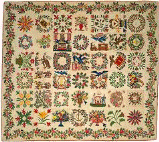Textile Society of America

Textile Society of America: Symposium Proceedings
Date of this Version
2024
Document Type
Presentation
Citation
Textile Society of America 2024 Symposium
Shifts & Strands: Rethinking the Possibilities and Potentials of Textiles, November 12-17, 2024, a virtual event
Abstract
Cod is so central to the history of Newfoundland that the process of salting and drying it is there called “making fish.” For nearly 500 years, Newfoundlanders made fish to ship globally until 1992 when the Canadian government announced an indefinite and ongoing moratorium on its cod fishery, changing the island forever. My presentation is about my own “making fish” from textiles while researching the history of cod in Newfoundland textile arts. When I first cut pieces of fabric into the triangular shapes of a salted cod split, I wanted a garland of quilted fish for my Christmas tree in Montreal. The repetitive gestures of cutting and stitching made me reflect on my ancestors, who wove their own fishing nets to catch and make fish, and who were terribly exploited by the truck system that kept them impoverished despite their labour. I also considered cod’s role in colonialism: it was sent to the West Indies in exchange for molasses and rum—still essential ingredients in Newfoundland—during slavery. I recalled how the moratorium highlighted the urgency of sustainable practices, and remembered my awe at my late Uncle John’s knowledge as he showed me how to cod jig during the summer food fishery. I began integrating his clothes into my quilted fish, making larger splits as comfort objects. A nostalgic impulse thus turned into an art project meant to sustain cultural heritage and personal connections to the past while acknowledging the complex historical meanings of this former food staple.
Included in
Art and Materials Conservation Commons, Art Practice Commons, Fashion Design Commons, Fiber, Textile, and Weaving Arts Commons, Fine Arts Commons, Museum Studies Commons


Comments
Published by the Textiles Society of America
Copyright 2024, the author. Used by permission